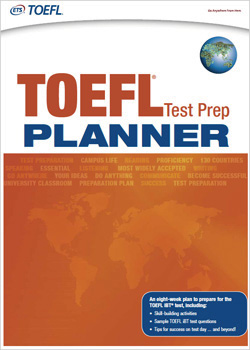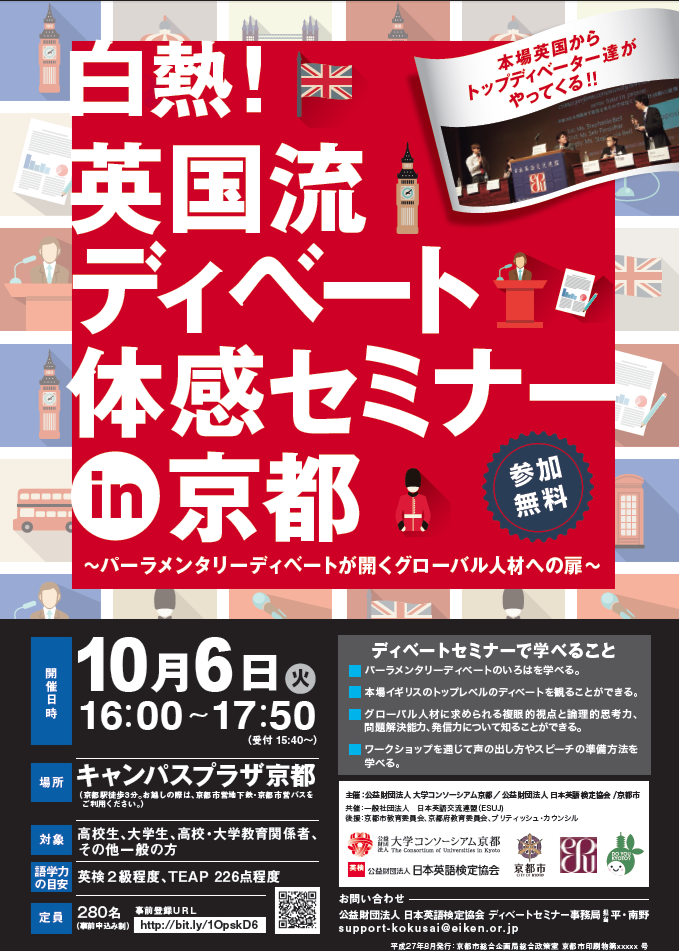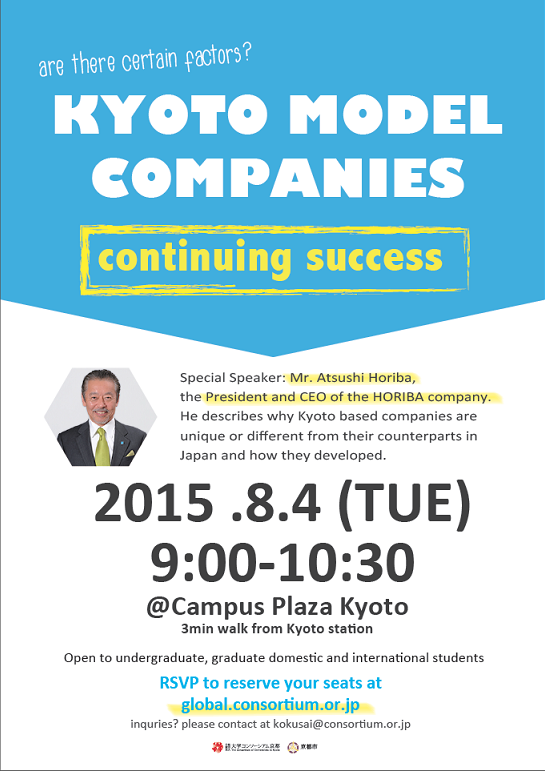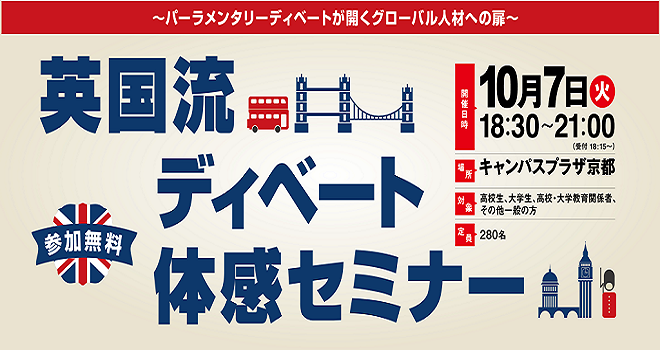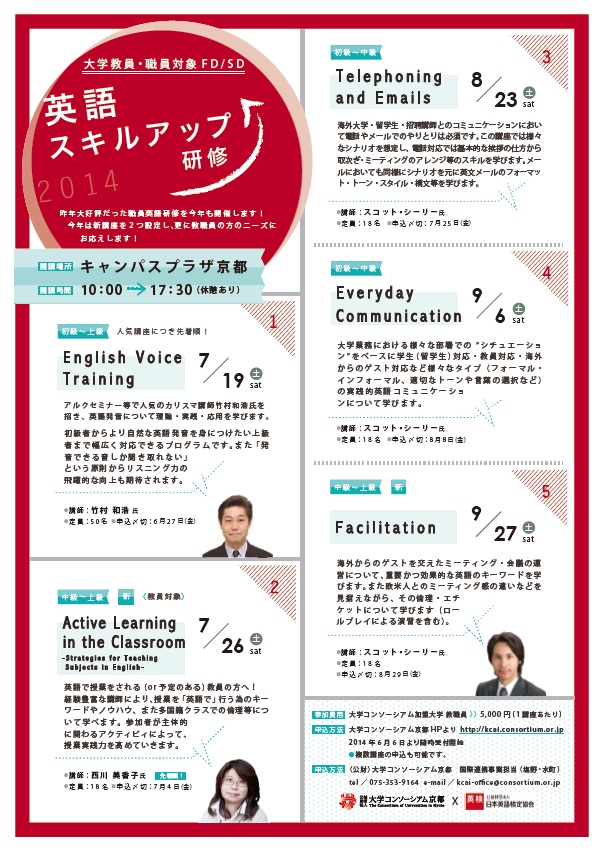On Saturday, March 28, at Campus Plaza Kyoto, we will hold a lecture and a report on the results of the “Heisei 26 Study Abroad Dispatch Program Development Support Project,” which is a joint project between Kyoto City and the University Consortium Kyoto, and “Development and Practice of Effective Study Abroad Programs” (concurrently: Heisei 27 Grant Project Recruitment Briefing).
This time, we will invite guests from the front lines who plan unique study abroad programs to talk about useful development and management based on practical talks.
In addition, we will explain the recruitment of support projects for the next fiscal year, report on the results of the programs implemented in various countries so far (posters), and provide a small opportunity for related parties to interact (questions are also possible).
We are looking forward to the participation of a wide range of people, including university faculty and staff, who are interested in planning to study abroad.
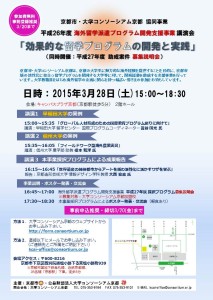
Business Overview
With the aim of providing attractive overseas experiences to university students in Kyoto, the Kyoto City University Consortium Kyoto is promoting a project to support the development of study abroad programs for member universities, junior colleges, and graduate schools of the University Consortium Kyoto.

Outline of the event
“Heisei 26 Study Abroad Dispatch Program Development Support Project” Lecture and Achievement Report Meeting
Heisei 27 Grant Project Recruitment Briefing
theme
“Development and Implementation of Effective Study Abroad Programs” (concurrently: Heisei 27 Grant Project Recruitment Briefing)
Re
Saturday, March 28, 15:00~18:30
meeting place
Campus Plaza Kyoto (5 minutes walk from Kyoto Station) 2nd floor hall
〒600-8216 939 Higashi-Shiokoji-cho, Nishitoin-dori, Shimogyo-ku, Kyoto
sponsorship
University Consortium Kyoto, Kyoto City
Capacity
Approximately 70 (for faculty and staff, regardless of full-time or part-time work status)
Participation Fee
Free *Pre-registration is recommended.
program
| time |
substance |
| 15:00~ |
opening |
15:05~15:35
【Speech】 |
“Toward the Creation of an International Education Program for the Development of Global Human Resources”
Waseda University Center for International Program Coordinator Kunimitsu Manaya |
15:35~16:05
【Speech】 |
“Fieldwork-type Overseas Agricultural Training”
Shinshu University, Faculty of Agriculture, Assistant Professor, Kazuhiro Nemoto |
16:15~16:45
[Report on the results of the selected program] |
“Learn how to use art to revitalize the city from a sister city that is a World Heritage Site”
Kyoto University of Art and Design, Department of Information Design, Professor Hiroshi Onishi |
16:45~17:00
【Recruitment Briefing】 |
Study Abroad Program Development Support Project
Heisei 27 Recruitment briefing session for adopted programs
*Target: University Consortium Kyoto member schools |
17:30~18:30
【Poster Presentation and Networking Meeting】 |
Poster presentation and exchange meeting (with snacks) |
| 18:40 |
Closing |
Application
Participating faculty and staff members should apply by Friday, March 20 in one of the following ways.
Method 1
Please apply through the following website.

Method 2
Please apply by e-mail.
【Subject】26 Study Abroad Dispatch Program Development Support Project Lecture, Achievement Report Meeting, Recruitment Briefing Session
[Full Text] (1) Name (furigana) (2) Affiliation and job title
Please apply to kcai-office■consortium.or.jp with the above contents.
(Please replace ■ with @)
* We will send you a confirmation email after receiving your application.
Inquiries
University Consortium Kyoto, Educational Development Division, International Collaboration Project
TEL:075-353-9164(direct) FAX:075-353-9101
〒600-8216 Shimogyo-ku, Kyoto-shi, Nishitoin-dori, Shiokoji, Shimo-ku, Kyoto, Campus Plaza Kyoto
* Reception hours: Tuesday ~ Saturday 9:00 ~ 17:00 (excluding year-end and New Year holidays)















